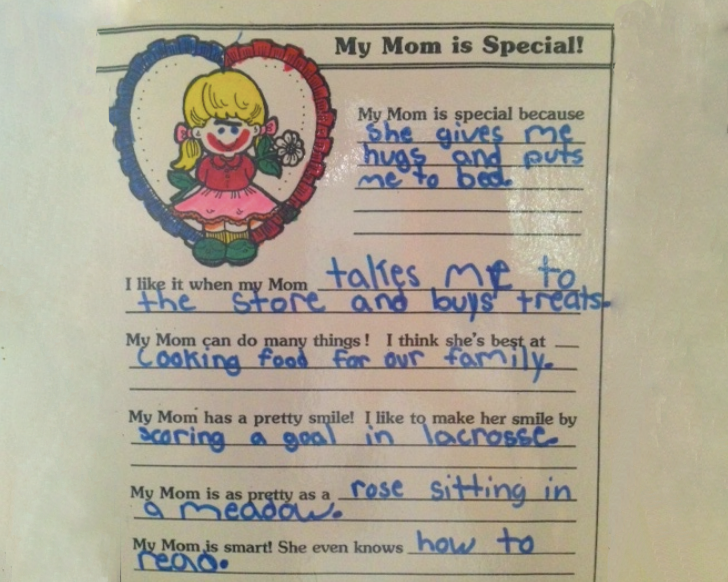Are you a good mother?
If you’re anything like me, the very sound of that question makes you slump your shoulders, furrow your brow, and exhale a guilt-ridden sigh of defeat.
And if you’re anything like the mothers I talk to all over the world, the little voice in your head probably said, “Pfffft, not really,” before you gave it any thought.
There is a good reason this question gives us pause, but it’s interesting how we don’t pause nearly as long when answering the same question in other areas of our lives.
For instance, if you were trying to evaluate “how good you are” in other scenarios, you’d likely answer the question with ease and little effort. Like I did here:
Am I a good wife? I believe my husband would say yes. On most days.
Am I a good friend? It goes in fits and spurts, but overall, I’d put my performance in the “win” column.
Am I a good cook? Decidedly, no. But I’m okay with it.
Am I a good boss? Yep.
Am I a good tennis player? I stink compared to my friends. But, I love playing so that’s something.
That was easy enough.
A few observations I made while doing this exercise:
- I tended to evaluate the scenarios using the law of averages. I have good days and bad days, but on the whole, am I doing a reasonable job?
- I am perfectly fine with doing a reasonably good job. For example, I’m not trying to be the perfect wife (sorry, hubby); I’m trying to do the best I can.
- I was most concerned about my own opinions, not what I thought other people would say.
- I focused on effort. If I put effort into tennis and cooking, I feel good about the effort even if I don’t feel great about the results.
What’s interesting (and sad) is that when it comes to evaluating our jobs as mothers, however, we tend to approach our answers in exactly the opposite manner.
- We expect to be awesome every hour of every day. If I raised my voice with my daughter this morning, I must be a terrible mother. We strive for perfection—24/7, with no reprieve.
- We consider everyone’s opinion except our own. Last Monday, someone suggested I travel too much, and everyone questions why I don’t cook for my family more often. Clearly, I suck.
- Effort means nothing.
But imagine what would happen if you applied the fair standards you use to evaluate most life categories except motherhood…for motherhood?
- You’d use the law of averages vs. evaluate your performance all day, every day.
- You’d strive to do a reasonable job vs. expect perfection.
- You’d consider your own opinion vs. everyone else’s.
- Your effort would matter vs. mean nothing.
It makes sense that our standards would (and should) be high, but how can we find a way to give ourselves a break? How can we silence the inner drill sergeant who constantly suggests we’re not good enough?
The other night, I found a way. A great way.
I believe the world revolves around expectations. And I think we’re living up to the wrong people’s expectations about what makes a good mother.
- We want the kindergarten teacher to think we’re a good mother.
- We want the next-door neighbor to think we’re a good mother.
- We want the soccer coach to think we’re a good mother.
- We want the random woman behind us in line at the store to think we’re a good mother.
- We want the 17 year-old lifeguard at the pool to think we’re a good mother.
Honestly, I suspect I have 10 to 12 different people I’m trying to convince of my mom-ing on a regular basis.
Well, I used to anyway. Until I saw this.

Recently, I was at a friend’s house and noticed this picture hanging in her kitchen. It’s a fill-in-the-blank exercise from a 9 year-old boy to his mommy:
Ohhhhhhh. Right. The children! Maybe that’s whose expectations matter. Not our own! And certainly not those of random strangers at the grocery store.
So, how do your kids feel about how you’re doing? You know, those people. The ones you work so hard for. The humans you’d run into a burning building to save. The cute little monsters who got you into this mess in the first place. Why not let them comment on your game?
I bet they’ll help you lower your perfection bar, plus tell you that you’re already clearing it by 100 feet.
Ladies, we’re trying way too hard. We’re putting too much pressure on, and being too mean to, ourselves. We don’t need to be perfect all the time. We just need to take our kids to the store and buy them treats. We don’t need to cook organic food all the time. We just need to cook. We don’t have to read the New York Times every day. We just need to know how to read.
So ask your kids what they think, and don’t see it as a performance review. In fact, lead the witness. Ask them, “What makes me a good mom?”—and then listen.
I tried this exercise on for size when my daughter was 6-years-old, and she said (in three seconds flat), “You’re nice to me and buy me pink clothes.”
That’s the freakin’ bar? It’s 87 feet below where I’ve been setting it. Being nice and buying pink jumpsuits? Then I walked over to my 5 year-old son, pulled off his headphones, and started a similar conversation:
Me: Alex. What makes me a good mommy?
Alex: Ummmmmmm. Being nice. And cookies.
No joke.
Of all the adjectives I would use to describe myself as a mother, “nice” is not one of them. I lose my temper more than I’d like. I raise my voice more than I should. And I occasionally (Okay, frequently) roll my eyes.
So while I don’t really fancy myself a “nice” mother, it was the first thing they both said—and they weren’t even together when they each answered the question.
Now here’s what happens if you don’t ask.
I was at a conference in San Francisco last year and during a panel, a very successful creative director, PJ Pereira, talked about the pressure so many mothers put on themselves. He told the audience that his 61 year-old mother recently asked him if he felt neglected because she’d worked a lot when he was growing up.
His response?: “Neglected? I don’t remember feeling neglected. I remember having a rockstar mom.”
If we assume PJ’s mom had him when she was 25 years-old, that means she carried that damaging thought around in her heart and on her back for 36 long years.
Her son saw her as a rockstar. She saw herself as negligent. Thank God she asked.






